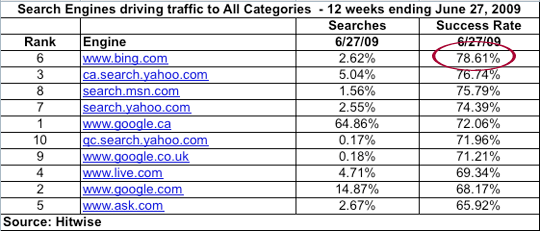Best Search Engine In Canada? Hitwise Says It’s Bing
In a detailed report about the Canadian search landscape, Hitwise says Bing is the best search engine at producing “successful searches,” beating out both Google and Yahoo, as well as their Canada-specific search engines. The chart above, provided specifically to Search Engine Land, shows that Bing is the 6th most popular search engine in Canada, […]
In a detailed report about the Canadian search landscape, Hitwise says Bing is the best search engine at producing “successful searches,” beating out both Google and Yahoo, as well as their Canada-specific search engines.

The chart above, provided specifically to Search Engine Land, shows that Bing is the 6th most popular search engine in Canada, but has the best success rate at 78.61%. That’s about 2% better than Yahoo Canada (ca.search.yahoo.com), and more than 6% better than Google Canada (www.google.ca).
It’s important to understand how Hitwise defines a “successful search”:
“A successful search is defined as one where the consumer leaves the search engine after performing a search.”
You could make the argument that some searches are successful even if the user doesn’t leave the search engine, especially considering the availability of search shortcuts and “instant answers” that sometimes show up on a search results page. But without knowing how many queries lead to shortcuts and answers, there’s no way to gauge their impact on these Hitwise numbers. Plus, it’s quite possible that searchers still leave the search engine even when a shortcut appears, which would further minimize their impact on the definition of a successful search.
Overall, Hitwise says an average of 70% of searches across all search engines in Canada were successful in the 12 weeks leading up to June 27, 2009. As you’d expect, though, when Canadian searchers add a geographic modifier to a query — such as “wedding dresses canada” instead of just “wedding dresses” — the percent of successful searches goes way up.
Oddly, though, Canadian searchers seem to lag behind U.S. searchers when it comes to the complexity of their search queries. Hitwise says more than half of Canadian search terms contain only one or two words.
The chart above shows that Canadian searchers use one- or two-word queries 51% of the time. That’s less than UK searchers, where the number is close to 60%, and more than the U.S., where 43% of searches had only one or two words.
Other interesting pieces of data from the Hitwise Canada Search Report:
- When you combine the .com, .ca, and other domains, Google powers 80% of searches in Canada. MSN is second with 9% (combining Bing and Live.com), and Yahoo third with 8%.
- The top 17 search terms used in those four weeks leading up to June 27th were all navigational — searchers looking for specific web sites like Facebook and YouTube.
- Canadians are bigtime gamers. The top non-navigational English search term was “games” and the top French search term was “jeux,” which also means “games.”
- Search engines are the largest traffic source for web sites in Canada: 33% of all web site visits in June came from a search engine.
Back to the headline of this article … it’s worth remembering Greg Sterling’s article yesterday about how U.S. searchers say Google is the best search engine. The Hitwise data reported here isn’t based on a consumer survey, but on measuring searcher behavior. You can’t help but wonder what Canadian searchers would say if they were surveyed about search satisfaction. Would the results match what we’re reporting here?
Contributing authors are invited to create content for Search Engine Land and are chosen for their expertise and contribution to the search community. Our contributors work under the oversight of the editorial staff and contributions are checked for quality and relevance to our readers. The opinions they express are their own.
Related stories
New on Search Engine Land
